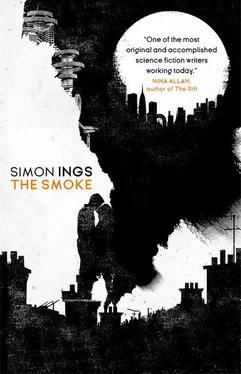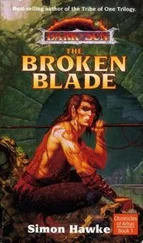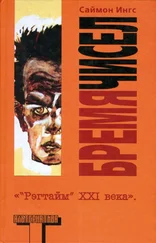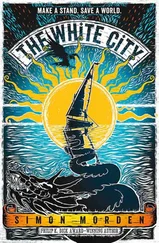My eyes fought to adjust, my mind to comprehend what I was seeing. The back-and-forth of metal blades as fine and sharp as grasses in the wind should have made those tents tableaux of violent atrocity. But as I walked, glimpsing each figure – here a man, there a woman, here two women, there a family gathered around a relative gone so to fat and out of true that it was not possible to guess the person’s sex – it came to me how happy everyone was here. How unconcerned. Around me rose a great contented murmur of calm and private conversation, which my ear, in passing, muddled to a giant, restful hive-hum.
The reclining figures, naked on their couches, watched my progress without embarrassment or self-consciousness of any kind.
Those whose bodies were hidden under thickets of threshing blades were hardly less passive. Their half-closed eyelids and small smiles suggested that they were drawing from the experience, and in full view of everyone, some small, innocent pleasure.
Here and there a figure, unattended at present, lay virtually hidden behind that sharp, weaving stuff. But I saw no blood, the blades dipped but did not appear to penetrate, and I began to wonder if that dangerous metal foliage was, after all, anything more than a sort of massaging mechanism.
I saw children – real children, not Chernoy’s Processed infants – by several of the couches, holding the hands of prone men and women who must, I supposed by their age, be their grandparents. Some were staring up in wonder at the faces of these ancient beings. Others, bored at last, were playing tag around the tents while their parents – who after all were only grown-up children themselves – kept vigil around the beds of their parents.
So many sensations and ideas pressed upon me all at once. It was only as I walked, snatching furtive glimpses, that I was able at last to parse what I was seeing. I was in a great tented gathering of the dying, where the naked dead-to-be held hands with the yet-living. The prone, plump, pinkish bodies on their couches never moved. Each tent was a tableau, warmly lit and calm. A series of nativities. The metaphor was an apt one, I saw now, for once the initial shock was past, I was able to register what was surely the point of the whole Process: every naked figure on its couch, young or old, man or woman, had a belly swollen with new life. Everyone lying here, regardless of their age or sex, was pregnant, and in dying they would, I supposed, give birth to themselves.
Standing lost in all that fertile dying, I knew then that I could not do what I had come to do. How could I presume to dissuade my mother from this new chance? What right had I to tell her she should die in the old world, she who had taken the decision to live in the new? Why had it even occurred to me to do this? Because I was afraid for her? Or because I was afraid of her, and what she would become?
The great warm human buzzing around me became a scent in the air, neither spring nor autumn, neither new life nor rot, but something else, something unprecedented, new to the Earth, which could not ever be the same again. I breathed it in and found myself, quite unaccountably, in tears.
I wondered how I would ever find my mother; and if I missed her, if I would see her before she was a child again.
* * *
Bob paid his only visit to Fel and me. He arrived late one Friday evening in June, right in the middle of my end-of-year exams, wandered goggle-eyed around our new apartment, and in the morning insisted that he go on his own to Ladywell to talk to Betty. And when he panicked, lost beyond all saving somewhere out in Woolwich (as had been inevitable), he rang, not me, but Stella, from a kindly stranger’s phone (‘I have a gentleman here says he’s lost, he says you’re his sister-in-law.’)
Stella put as brave a complexion on the afternoon as she could. But it was clear enough, once she had rescued Bob and led him to that place where Betty was at rest, dying and being reborn at once, that Bob would prove inadequate to the occasion.
I imagine him there, on the threshold of that tented fairy space, frightened and affronted. What on earth would he have found to say to his wife, in such surroundings, and after so long an estrangement?
Well, it turns out he did not enter. He never got that far. He stood on the travellator platform, talking to his wife on Stella’s picturephone. They cannot have been more than a couple of hundred yards apart.
It took me most of the summer to shake off my anger towards Stella. Eventually she managed to persuade me to break bread with her. Or at very least, fork cake, in the lobby of her usual hotel. She had decided to meet the controversy head-on, and insisted on playing me the recording of Bob’s conversation with Betty.
‘Stella,’ I protested, ‘it’s private. What were you thinking, recording this?’
‘Oh, don’t be silly,’ she said, as oblivious as her boyfriend to old notions of personal privacy. ‘The phone records everything.’
I persuaded her to show me only snatches of Betty’s side of the conversation with her husband. Betty’s face, withered more by suffering than age, loomed large in the frame of Stella’s phone.
‘The thing about cancer,’ Betty said, ‘is that it hurts. So you learn to fold the pain up inside you. You crumple it up, so that, even as it gets stronger, it’s all the time getting tighter, denser, smaller, like a stone. And then you throw the stone away. You see? You throw it into the sea. And though the waves will return it, again and again, you throw it back into the water, again and again.
And so it goes, back and forth, back and forth, thrown and returned, thrown and returned, day after day, and you hope that at last the waves will erode the stone. You hope, one day, there will be no stone. Though there always is.
‘But Stuart, this is the point. When you take pain like that, every day, and squeeze it tight, squeeze it into a stone, and throw that stone away, eventually you realise: you can do that with anything. Any part of yourself. And that’s why this has been easy for me. Do you see? I’ve been doing this for years. Stuart. Feel my belly.’
‘That’s enough,’ I said.
Stella leaned forward, over the table, the phone firmly in her grasp. ‘Watch.’
Betty had turned the camera upon her body. Waving steel grasses tipped across her supine form, hiding her gravid belly. Out of focus, writhing and spiralling, they stirred her flesh as though it were a soup.
I sat there, helpless.
‘Touch my belly. Feel how hard it is. Like a stone. Are you going to catch it, Stu? Are you going to catch this stone? Are you going to look after me?’
The picture went out.
I got to my feet. ‘You had no business showing me that.’
‘What are you talking about?’
‘That’s between Mum and Dad. You had no business recording it.’
‘ Stuart. ’
I buttoned my coat.
‘Did you not hear? She was talking to you. That was all meant for you.’
I shook my head. ‘She was talking to Dad. She’s confused.’
‘Please, Stuart.’
I threw a twenty pound note on the table, a calculated slight since Stella always paid – pointless, too, since the hotel no longer accepted paper money – and I left.
* * *
Bob’s own interpretation of Betty’s state of mind had been refreshingly straightforward. ‘She wasn’t interested in anything I had to say. Mind you, she never was.’
Following his aborted trip to Ladywell, Stella saw him back to our flat. He spent the evening with me and Fel, saying very little, and the next day he returned to Hebden by the noon train. His visit, which I had expected to be both awkward and intrusive, proved in the end too short for us. Fel felt she must have done or said something wrong. ‘I don’t think he liked me very much,’ she said as we pulled sheets and bed covers from the couch where he had slept, and I said nothing, because in all honesty she was probably right. It must surely have occurred to Bob that the Bund, which had won dominion over so much already, had now won dominion over his wife. And if that was the case, then who was Fel but the agent through which the Bund would win dominion over his son?
Читать дальше












